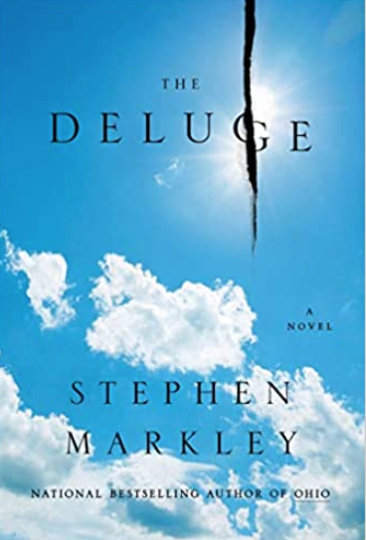I spent a significant amount of time over the last few weeks reading the novel The Deluge, by Stephen Markley. I'll say right here at the start that The Deluge is not for the faint of heart. For one thing, it comes in at just under 900 pages. And those aren't pages with large print and big margins, either, more like nine-point type and half-inch margins. So to work through it requires a sobering investment of time and energy. And the story it has to tell is no walk in the park either. One of Markley's primary goals is to examine the likely consequences of climate change over the next twenty years. That in itself is sobering, in that many of the prognosticators currently wringing their hands and crying out loud about coming existential disasters talk about what is likely to be happening in 2050 or 2100. Markley's time frame is much more compressed. The sequence of events described in the book starts in 2013 and ends in 2039. Nothing of what is described is remotely implausible, or remotely encouraging. Markley describes in unflinching detail multiple scenarios which people across the globe are already experiencing and can expect to experience in the not-too-far-distant future: heat waves, fires, water shortages, dust storms, and decimated crops on the one hand; floods, storms, and sea-level rise decimating coastal cities across the world on the other. Those events will likely result in the displacement of literally billions of people who will find themselves homeless and on the move without resources.
So yes, it's a dystopian novel based on the impact of climate change. But one of the things which makes it such a gripping read is that it is also a character-based novel that depicts, again in utterly convincing detail, the interactions of an enormous cast of characters, the most central of whom are intelligent, well-meaning, and socially engaged, and trying to fight, each in their own way, against what they correctly perceive to be an existential threat to human life on earth.
There are 41 chapters in the book. Some are narrated in conventional fashion by major characters. They include a scientist, a charismatic social activist (one of the most memorable characters I've ever encountered on the page), the leader of an eco-terrorist group, an ad rep for a company helping industry give the appearance of supporting climate change activism while working frantically behind the scenes to forestall any change in the status quo. There are also chapters presented as primary-source documents: news articles, magazine articles, and most notably, position papers authored by a fiercely intelligent autistic savant who is tasked by various government agencies with trying to come up with coherent and intelligible delineation of the fearsomely complex issues which need to be dealt with through legislation. (The book would be worth reading if only for the depth and clarity of those position papers.) Each of these characters comes alive as a fully realized human being embedded in a network of family and friends, all of whom have their own stories and challenges as the world careens toward disaster.
What became clear, at least to me, as the story moves from year to year and crisis to crisis, is that the scientific and technical challenges having to do with dealing with climate change, vexing as they are, will amount to nothing next to the human challenges. Any single proposal for dealing with climate change, much less a coherent program of necessary initiatives, will necessarily be met with a torrent of indignation, outrage, obfuscation, disinformation, and denial. Some of that pushback is overt and explicit; a larger quantity is covert and maliciously duplicitous. None of which should be surprising to anyone who pays attention to our current political environment, which is exactly and predominantly that way, and getting worse every day.
I've read I don't know how many thousands of novels in my lifetime. I don't think I've ever read one more ambitious, or more successful in realizing its ambitions, than The Deluge. It's gripping. It's frightening. It's extraordinarily well-imagined and well-written throughout. It's certainly understandable that most of us would prefer to pretend that the threats we are facing are less immediate and less pressing than they actually are. Al Gore was attempting to call everyone's attention to "An Inconvenient Truth" sixteen years ago. What has changed in the meantime? Diddly squat, that's what. Markley's principled mission is to ask that we consider, individually and collectively, the human consequences of that sort of lassitude.
Since finishing the book, I find that as I scan the news each day I see the harbingers everywhere of the world as he imagines it in this book. Just this week the New York Times had a lead article entitled "Earth Is Nearing The Tipping Point For A Hot Future," another "last chance" reminder about the just-released UN report on climate change. What has been the response of our congress, of our president, of our global leadership? Radio silence. Big surprise. Maybe Stephen Markley can help tip the scales, at least for those willing to invest the time and effort into reading The Deluge. I strongly recommend that you be one of them.










